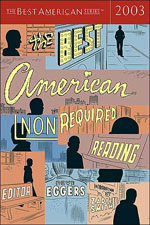Author of the memoir Another Bullshit Night in Suck City, Nick Flynn delves into literary journalism in "The Ticking is the Bomb," a painful portrayal of torture within the realm of the war in Iraq. This piece was inspired in part by the abuse at Abu Ghraib. Flynn interposes his personal history with his 2007 visit to Istanbul, where he observed interviews with victims of torture who were imprisoned by American forces.
[We wonder what the BANR members think about the approach of this article: a writer is summoned to Istanbul (a bridge between the Western world and the Muslim world) to report on torture.]
Osvaldo: I liked the beginning, like how he compared and contrasted his life and the torture that happened in the war.
[The nature of literary journalism is that the author can intrude and intersperse his personal life throughout the piece. This type of essay seeks to make all these disparate puzzle pieces come together. In terms of the narrative jumping around, what did you think? Does it make sense?]
Naomi: I enjoyed reading it, and I thought it was all going to come together, even though at times some of the ideas felt convoluted to me.
Katie: What came together really well and what was powerful to me were the parts about the detainees' experience. Those parts combined so many elements: the detainees as real people, them talking about what happened to them...that was the best part for me.
Yael: I really liked it. I'm kinda really interested in this topic even though I thought the second-person narration used at the beginning was risky. Still, there was a lot going on, and it was easy to stay interested for me because there was a lot going on. It wasn't boring; it was the opposite.
Tanea: It kept my attention. It had a lot of things going on. When he stopped talking about himself and went on about other stuff, I was still interested. I wasn't lost.
[This could be considered a lyric essay; it incorporates creative nonfiction, personal observation and personal history, and then straight-up journalism. How did Flynn pull it off?]
Yael: It is kinda weird that he switches from second person to third person. Kinda weird and kinda cool. Different. A lot of his personal stories kept me interested. But it's not about him, in essence.
Eli: It never went off on a complete tangent. It felt like everything came back to the main subject: torture. Sometimes if I read a piece that is supposed to be about something else, the author is being verbose just for the sake of it. But this wasn't like that. It just worked; the transitions were smooth enough that it worked.
Naomi: I liked all the different pieces. I think that it's totally fine to have incongruous-seeming parts to a piece. But what were we supposed to take away from it?
[Does the use of personal history detract from the suffering of the detainees? Is it appropriate for the author to insert himself into the story?]
Yael: I think it was. Maybe the author was thinking it's been done, that torture has been written about so much, and other people didn't include their own story like how I now have the chance to do. This was a way to make it new and fresh again.
Eli: I feel like [war has] been a prevalent subject before, and I appreciated a personalized view of it. It could have been a more straightforward, expository piece about war, and it would have been valid even with an emotional distance. But it wouldn't have had the same oomph.









No comments:
Post a Comment